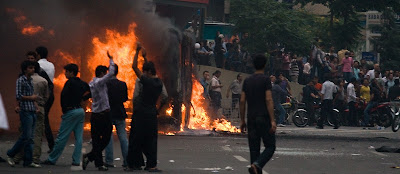
Below is an extract from Roger Cohen's opinion piece in The New York Times, recounting his experience walking through Tehran during a recent anti-government protest.
"Can't the United Nations help us?" one woman asked me. I said I doubted that very much. "So," she said, "we are on our own."
Almost everyone has been following the unrest in Iran over the past few weeks. For those following it closely, it started with the pre-election hope that the Iranian president Mahmoud Ahmedinejad might be supplanted by the slightly more moderate Mir Hussein Moussavi. As we know, that didn't happen, and Ahmedinejad claimed victory in a supposed landslide, defeating Moussavi by a wide margin across the country, even in Moussavi's own home town.
It was the brazen and condescendingly shoddy electoral fraud that sparked the protests, which began merely as demands for a recount, or at least some sort of accounting of the election. But the government decided to start a shoving match with its riot police and the Basij, unofficial paramilitary squads charged with either beating protesters or impersonating them to commit arson, creating an aura of chaos the government can capitalise on to justify the imposition of brutal order.
I think, if we're honest, most of us expected the Iranian "velvet revolution" to die down after a few days of student protest, defused by the conscientious government application of violence along with calls for compromise and moderation; the classic carrot-and-stick approach. But the protests have stretched and grown, and as pixelated images and feeds of protests keep surfacing, the drama, the stakes, and the potential of this uprising have persuaded a much larger audience than third-world unrest usually does.
A YouTube video surfaced yesterday showing an Iranian girl, shot in the heart, dying on the street, full of blood. It was obscene in both content and context, a click and a half away from the cutest Welsh Corgi taking a bath in a sink. It's upsetting and it should be; I'm glad that YouTube, Twitter and Facebook have become the most important outlets for information on the situation in Iran. The media have been calling it "citizen journalism", but that has too many connotations of amateurishness and unaccountability. They don't pretend to analyse, or present a whole, unbiased report of the situation. I think its function is more simply to witness, a globalisation of witnesses which enables us, however imperfectly, to draw a lens on events normally out of sight.

I'm glad that the uprising has achieved (and it is an achievement) so much international attention, because Iran should not be on its own. The impotence of the UN in the face of the quoted woman's appeal is intolerable. She believed that domestic injustice is an international affair, and she's right. There are no convincing arguments for the principle of non-intervention. There are costs, and risks of course. The international community should be wary of intervening in a crisis it doesn't understand, or where its intervention would be counterproductive.
But the international community also has a mandate to endeavour to understand foreign crises, and engineer interventions that aren't counterproductive. This is a moral mandate which overwhelmingly trumps the legal mandate not to intervene, solidified through centuries of moral barbarism and intellectual dishonesty. Conventions established when "racism" and "empire" were open adjuncts to "stability" and "empire" should have no hold over us today.
The Iranian uprising might or might not have its back broken by the state, still capable and possessed of a gnashing determination to survive. Either way, the rest of the world won't have helped much. It seems naive to even speak of a global will to intervene when Russia and China hasten to congratulate successful sham elections and militate against UN criticism of state brutality. But what this moment should tell us is that however foolish, risky or ingenuous speaking might be, there is yet something to speak of.




0 comments:
Post a Comment